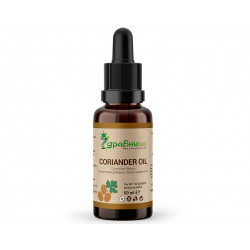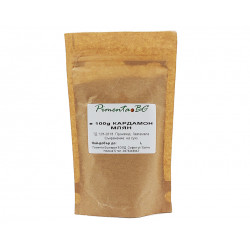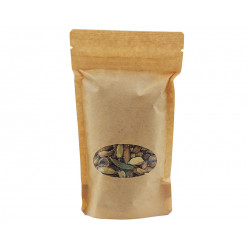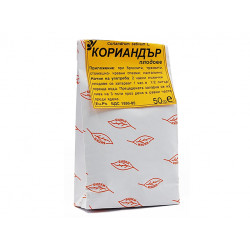Cardamom - for a strong stomach
The fruits of cardamom have been used since the Greeks and Romans. They are also mentioned in the works of Hippocrates.
Malabar cardamom is considered one of the best, and there are also Ceylon, Bombay, Aleppo, and other types available on the market, which are used as a spice, but not for medicinal purposes, due to the high content of essential oil. Cardamom fruits are also rich in resins, sugars, flavonoids, etc.
Cardamom essential oil has a strong, pleasant aroma and slightly astringent taste. Both the berries and the essential oil are used as an appetite stimulant as they stimulate secretions in the stomach and intestines. They also have an antiseptic and tonic effect on the body, but it should be borne in mind that they slightly excite the nervous system.
Cardamom is a common ingredient in curry, it is also used together with ginger, nutmeg, anise.
For medicinal purposes, it is recommended as a carminative. It is used in small doses of powder, 3 times a day on the tip of the knife 15-20 minutes before meals.
Caraway seeds - for good breastfeeding
There is archeological evidence of the use of caraway as far back as the ancient Egyptians 3,000 years ago. Its fruits are rich in essential oil, flavonoids such as quercetin, kaempferol, coumarins, tanning properties, etc. The main components of the essential oil are the carvone ketone and terpenes.
The fruits of caraway can be replaced with those of the ground elder /Aegopodium podagraria/. Not to be confused with elderberry /Sambucus/!
Caraway seeds and essential oil stimulate the secretion of the gastrointestinal system and mammary glands. They are suitable as a carminative, to soothe colic in the stomach and intestines, and support the work of the stomach. They are also considered a natural disinfectant in kidney and bile diseases and are suitable when a person excretes more urine and bile juice. They are used to heal the liver and also to increase breast milk after childbirth.
Caraway essential oil is also very suitable for asthma. It is taken internally on a lump of sugar, 2-3 drops, 3 times a day before meals.
It can be prepared and extracted: 2 teaspoons of finely grated fruit placed in 2 teaspoons of water, left for 2-4 hours, then stirred, divided into two and drunk in the morning and evening. That's the whole amount for the day.
For stomach pains and indigestion, it is recommended to chew 5-6 fruits 3 times a day before meals.
Cumin - has been cultivated in Bulgaria since 1904
Cumin seeds have been found in ancient Egyptian tombs. They are also mentioned in the Bible. The ancient Romans used them as a spice and medicine. Taken internally, they cause the skin to turn pale.
Cumin originated in Central Asia, and today it is grown in the Mediterranean region. It has been cultivated in Bulgaria since 1904 in the southern parts of the country. Cumin seeds are rich in essential oil, polyphenols, resins and especially coumarins. Care must be taken with coumarins, because these substances, taken beyond the recommended dose, can damage the liver and kidneys.
The essential oil turns yellow after a longer stay.
When used internally, the fruits cause the release of secretions in the gastrointestinal tract, act as an antiseptic and prevent unwanted fermentation processes in the stomach and intestines.
Cumin and caraway are still confused today, not only because of their similar names, but they differ in appearance and chemical composition. They are most quickly recognized by smell. Also, caraway as a spice is used alone, while cumin is added to others. E.g. can be found in the composition of curry.
For medicinal purposes, cumin can help as an appetite stimulant, anti-gas and colic in the stomach and intestines, anti-constipation. It is best to make a water decoction: 1 teaspoon of finely grated fruit is poured with 500 ml of boiling water, boiled for 1-2 minutes, then soaked for 120 minutes /2 hours/. It is filtered and taken in 5 parts throughout the day. Another way is to chew 3-4 fruits with a glass of water 3 times a day before meals.
Coriander fruits - anti-vomiting
Coriander fruits have been mentioned since ancient times. Pliny the Elder mentions that it was also used as a preservative: fresh meat rubbed abundantly with coriander and vinegar preserved the meat even in warm weather. The Italian physician and botanist Mattioli in the 16th century indicated that, in addition to being a spice, its green leaves were a good remedy for stomach pain. Its fruits are small, grey-green, with a pleasant fragrant aroma and sweet taste.
Coriander essential oil smells like lemon and sage. It is rich in linalool, which gives it a pleasant smell and taste. The smell of the essential oil is stronger than that of the fruits.
The fruits and essential oil stimulate the release of secretions of the stomach, intestines, lungs, and bile secretion. They have a beneficial effect on blood vessels and have an antimicrobial effect. As a spice, the fruits can also be used in dried form without losing their smell, and they can be prepared lightly fried, without fat. For medicinal purposes, it is used as a carminative and expectorant, and against pain in the stomach and intestines. They can also be taken against vomiting and for hemorrhoids, and topically - as compresses for hard-to-heal and purulent wounds. An extract is made: 1 heaped spoonful of crushed fruits is poured with 250 ml. boiling water, soaked for 4 hours, strained and drink at once before meals. This dose can be used 3 times a day.
The essential oil is also suitable for bile problems, 5-10 drops 3 times a day before meals.







